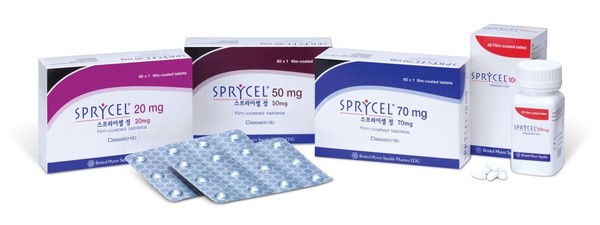The state health insurance review agency said it would broaden the reimbursement criteria for Sprycel (ingredient: dasatinib), a leukemia treatment by Bristol-Myers Squibb.
On Wednesday, the Health Insurance Review and Assessment Service (HIRA) released the review results on cancer drug reimbursement criteria.

HIRA decided to expand the insurance benefit criteria for Sprycel in combination with chemotherapy to treat pediatric patients aged one or older with newly diagnosed Philadelphia chromosome-positive (Ph+) acute lymphoblastic leukemia (ALL).
In October last year, HIRA broadened the reimbursement target for Sprycel only when used with chemotherapy to treat pediatric Ph+ ALL patients aged between one and 17.
The chemotherapy mentioned here is recognized only when it follows the protocol of the AIEOP-BFM 2000 study (Source: Blood. 2010 Apr; 115 (16): 3206-3214). This is because the study evaluated the safety and efficacy of Sprycel in combination with chemotherapy.
HIRA said it would broaden the reimbursement criteria for the combo of Sprycel and chemotherapy after expanding the reimbursement target last year.
However, HIRA did not elaborate on what the criteria were.
Lilly’s anti-cancer drug Retevmo (selpercatinib) and Pfizer’s leukemia treatment Mylotarg (gemtuzumab ozogamicin) failed to become eligible for new reimbursement. Also, the HIRA rejected Novartis’ request to expand the reimbursement criteria for Jakabi (ruxolitinib), a targeted therapy for myelofibrosis.
After obtaining the regulatory nod in March, Lilly applied for reimbursement for Retevmo’s three indications -- medullary thyroid cancer, thyroid cancer, and non-small cell lung cancer.
However, the application failed to pass the HIRA review.
Pfizer applied for new reimbursement for Mylotarg as the first-line treatment for adult patients with CD33 positive acute myeloid leukemia (AML).
Novartis’ Jakabi also failed to get broadened reimbursement to treat intermediate- or high-risk patients with myelofibrosis.

